
On Being Stoned
Charles T. Tart, Ph. D.
Chapter 14. Cognitive Processes: Memory
EFFICIENT AND ACCURATE access to memories is central to adaptive
human action, both in terms of keeping track of the nature of
immediate situations (intermediate-and short-term memory) and
in keeping immediate action congruent with long-term values and
knowledge (long-term memory).[1]
With marijuana intoxication, the user perceives a variety of alterations
in memory functions—enhancements, decrements, and falsifications.
MAJOR EFFECTS
Long-Term Memory
"My memory for otherwise forgotten events is much better
than when straight when I consciously try to remember"
is a fairly frequent effect (22%, 24%, 29%, 15%, 5%), which begins
to occur at Moderate to Strong levels of intoxication (6%, 25%,
29%, 9%, 1%). The converse effect, "My memory for otherwise
forgotten events is much worse than when straight when I try to
remember" is an infrequent effect (27%, 28%, 22%, 11%,
7%), which also occurs at Moderate to Strong levels (4%, 19%,
21%, 17%, 5%). The College-educated experience this worsening
more frequently than the Professionals (p <.05). The
young experience worse memory primarily at Fairly and Very Strong
levels, whereas the older users experience it primarily at the
Strong level (p <.05).
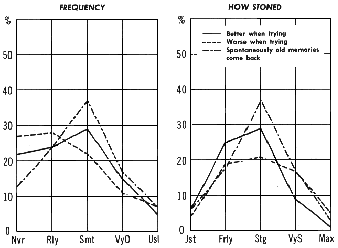 |
Figure 14-1.
INTOXICATION EFFECTS ON LONG-TERM MEMORY
Note.—For guide to interpreting the "How Stoned" graph,
see note on Figure 6-1.
|
Aside from consciously trying to recall things, a common effect
is "I spontaneously remember things I hadn't thought
of in years, more so than straight (does not apply to consciously
trying to remember things)" (13%, 24%, 37%, 17%, 7%).
This is more frequent among the young users (p <.05).
It begins to occur at the Strong levels (6%, 18%, 37%, 17%, 3%).
The relationships of these three aspects of long-term memory are
shown in Figure 14-1. Spontaneously remembering the past occurs
more frequently (p <.01) than recall becoming poorer,
and recall becoming poorer occurs at higher levels of intoxication
than recall becoming better (p <.05).
Comments from my informants suggest that the nature of poor recall
is one of selection; many memories are available, but they are
often the wrong ones, not those the user wants.
Intermediate-and Short-Term Memory
A very characteristic effect of marijuana intoxication is "My
memory span for conversations is somewhat shortened, so that I
may forget what the conversation is about even before it has ended
(even though I may be able to recall it if I make a special effort)"
(3%, 7%, 29%, 49%, 11%). It begins to occur at Strong and Very
Strong levels (4%, 15%, 39%, 30%, 8%). Heavy Total users need
to be more intoxicated to forget the start of the conversation
(p <.05).
Going from intermediate-to short-term memory, a common effect
is "My memory span for conversations is very shortened,
so that I may forget what the start of a sentence was about even
before the sentence is finished (although I may be able to recall
it if I make a special effort)" (8%, 24%, 31%, 31%,
5%). This drastic shortening of memory span begins to occur at
the Strong and Very Strong levels (3%, 9%, 28%, 29%, 22%), with
males needing to be more intoxicated than females to experience
this (p <.05).
In spite of this drastic shortening of immediate memory, it is
also a common effect that "I can continue to carry on
an intelligent conversation even when my memory span is so short
that I forget the beginnings of what I started to say; e.g., I
may logically complete a sentence even as I realize I've forgotten
how it started" (6%, 20%, 43%, 24%, 5%). This effect
also begins to occur at the Strong and Very Strong levels (5%,
13%, 33%, 29%, 9%). The college-educated experience this beginning
at higher levels than the Professionals (p <.05), and
the Weekly users at higher levels than the Daily or Occasional
users (p <.05).[2]
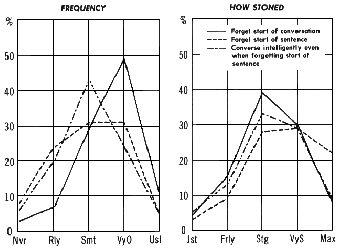 |
Figure 14-2.
INTERMEDIATE-AND SHORT-TERM MEMORY
Note.—For guide to interpreting the "How Stoned" graph,
see note on Figure 6-1.
|
The relationships of these three alterations of intermediate-
and short-term memory are presented in Figure 14-2. Forgetting
the start of the conversation occurs more frequently than forgetting
the start of one's sentence (p <.0005) or than being
able to converse despite a shorter memory span (p <
.0005). Forgetting the start of one's sentence occurs at higher
levels than forgetting the start of the conversation (p
<.01), and forgetting the start of one's sentence is rated
as beginning at somewhat higher levels than being able to converse
intelligently despite a shortened memory span (p <.05).[3]
Two related items dealt with elsewhere also illustrate the shortening
of intermediate-and short-term memory. Finding that thoughts
slip away before they can quite be grasped (Chapter 15) occurs
less frequently than either forgetting the start of the conversation
(p <<.0005) or the start of one's sentence (p
<.01), and at intoxication levels midway between these two
phenomena, albeit not significantly different from either of them.
Forgetting to finish a task one has started (Chapter 17) occurs
more often than forgetting the start of one's sentence (p
<.01), but with about the same frequency as forgetting the
start of the conversation. It occurs at lower levels of intoxication
than forgetting the start of the conversation (p <.01)
and much lower levels than forgetting the start of one's sentence
(p <.0005).
In sum, there is often an increasing shortening of intermediate-
and short-term memory span with increasing levels of intoxication,
as much as forgetting the start of a sentence one is speaking
at Strong and Very Strong levels, but it is commonly felt that
this does not necessarily have any effect on the intelligibility
of the user's conversation.
False Memories
A mild version of a user's memory playing him false is "I
think I've said something when actually I've only thought about
saying it, more so than when straight." This is a common
effect (18%, 24%, 36%, 19%, 3%), which may occur at the Strong
and Very Strong levels (3%, 9%, 26%, 34%, 8%). Users of Psychedelics
report it as occurring less often (p <.05) and at higher
levels of intoxication (p <.05) than Non-users. Light
Total users experience this mistake more frequently (p
<.05, overall), and Weekly users need to be more intoxicated
to experience this than either Daily or Occasional users (p
<.01, overall).
"I think something is a memory when it turns out to be
a fantasy, something I just made up but fooled myself into thinking
was a memory at the time (not the same as déjà
vu)" is a rare effect (47%, 27%, 20%, 3%, 0%),[4]
which may occur at the very high levels of intoxication (3%, 6%,
13%, 17%, 8%). Light Total users need to be more intoxicated for
this (p <.05).
The experience of déjà vu (Chapter 9), a
common effect beginning to occur at the Strong levels of intoxication,
has already been described; this is another instance of poor operation
of the memory process, for either a current situation falsely
has the quality of "memory" attached to it, or an actual
memory is not being completely labeled as a memory. It seems to
feel like a memory without really seeming to be
one.
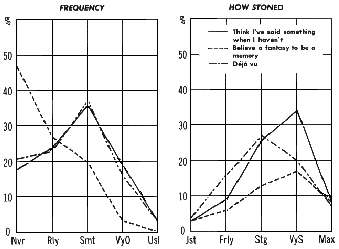 |
Figure 14-3. FALSIFICATION OF MEMORIES
Note.—For guide to interpreting the "How Stoned" graph,
see note on Figure 6-1.
|
The relationships between these three falsifications of memory
functioning are shown in Figure 14-3. Believing a fantasy to be
a memory occurs much less frequently than thinking one has said
something when he has not (p <.0005) or déjà
vu. Although déjà vu occurs at somewhat
lower levels of intoxication than the other two effects, the differences
do not reach statistical significance (p <.10 at the
greatest).
Thus while the "quality" attached to contents of consciousness
that identifies them as a memory may be frequently affected by
marijuana intoxication, it is seldom that this is affected strongly
enough for the user to actually mistake a fantasy for a memory,
i.e., he may frequently experience things seeming like
memories but he does not necessarily believe it.
Memory for Periods of Intoxication
If memory functions during the intoxicated state seem to alter,
what happens to the memories of the intoxicated state?
"My memory of what went on while I was stoned is good
afterwards, better than if I had been straight all the time"
is a common effect (19% 25%, 31%, 14%, 9%), which begins to occur
at the Moderate and Strong levels (13%, 24%, 25%, 13%, 1%). It
is reported as occurring more frequently by females (p
<.05), and by the College-educated (p <.05). The
Daily and Weekly users have this improved memory more frequently
than the Occasional users (p <.01, overall).
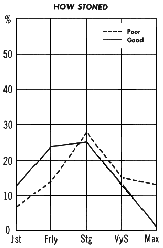 |
Figure 14-4.
MEMORY FOR PERIODS OF INTOXICATION
Note.—For guide to interpreting the "How Stoned" graph, see note on Figure 6-1.
|
The converse, "My memory of what went on while I was stoned
is poor afterwards compared to what I would have remembered had
I been straight" is also a common effect (18%, 24%, 24%,
16%, 17%), which begins to occur at Strong levels (7%, 14%, 28%,
15%, 13%). It occurs as frequently as improved memory, but at
higher levels of intoxication (p <.0005), as shown
in Figure 14-4.
Comments from informants make it clear that a good deal of the
poor memory for periods of intoxication is not ordinary forgetting
but what has been termed "state-specific memory." The
events of the intoxicated state are stored in memory, but they
cannot be retrieved in an ordinary state of consciousness. The
next time the user becomes intoxicated, however, he can remember
many of the things from previous periods of intoxication that
he could not remember in his ordinary state.
Thus the forgetting of periods of intoxication are a combination,
in unknown degree, of genuine forgetting (no initial storage and/or
no possible way of retrieval) and state-specific storage of memories.
A specific aspect of memory for periods of intoxication relates
to the results of reading during such periods.
"If I read while stoned, I remember less of what I've
read hours later than if I had been straight" is a common
effect (15%, 11%, 19%, 14%, 29%), which may begin at Moderate
levels of intoxication (13%, 29%, 23%, 5%, 1%). It is experienced
less frequently by Meditators and the Therapy and Growth group
(p <.05, overall) and more frequently by the younger
users (p <.01).
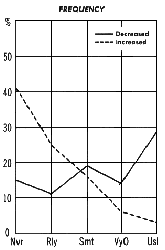 |
Figure 14-5.
MEMORY OF READ MATERIAL
|
The converse effect, "If I read while stoned, I remember
more of what I've read hours later than if I had been straight"
is infrequent (41%, 25%, 16%, 6%, 3%) and, when it occurs, begins
at the Low and Moderate levels (15%, 18%, 10%, 3%, 1%). It occurs
less frequently among the Light Total users (p <.001),
the Occasional users (p <.05), and the Non-users of
Psychedelics (p <.05). The Therapy and Growth group
experience increased memory for read material more often (p
<.05, overall).
Figure 14-5 shows that decreased memory occurs much more frequently
than increased memory (p <<.0005). The levels of
intoxication do not differ significantly.
ADDITIONAL EFFECTS
"I remember the most obvious things and laugh to think I
could have forgotten them" (Rarely, Strongly).
"Relive childhood experiences" (Usually, Fairly).
LEVELS OF INTOXICATION FOR MEMORY PHENOMENA
The overall relation of various phenomena to levels of intoxication
is shown in Figure 14-6. The overall ordering is highly significant
(p < <.0005).
FIGURE 14-6.
INTOXICATION LEVELS, MEMORY PHENOMENA
| Just | Fairly | Strongly | Very
Strongly | Maximum |
|
Type size code:
CHARACTERISTIC
COMMON
INFREQUENT
Rare |
|
| FORGET START OF SENTENCE |
| THOUGHTS SLIP AWAY BEFORE GRASPED |
| THINK SAID SOMETHING WHEN HAVEN'T |
| CONVERSE INTELLIGENTLY DESPITE SHORTENING
OF MEMORY SPAN |
| | | | | FORGET START OF CONVERSATION |
| | | | POOR MEMORY FOR PERIODS OF INTOXICATION |
| | | | Déjà Vu |
| | | | SPONTANEOUSLY RECALL THINGS LONG FORGOTTEN |
| | | | OFTEN FORGET TO FINISH SOME TASK |
| | | | EASILY SIDETRACKED |
| | | WORSE LONG-TERM MEMORY |
| | | BETTER LONG-TERM MEMORY |
| | | GOOD MEMORY FOR PERIODS OF INTOXICATION |
| | REMEMBEER LESS OF WHAT IS READ |
| REMEMBER MORE OF WHAT IS READ * |
|
| Just | Fairly | Strongly | Very
Strongly | Maximum |
*There is some question whether this effect is available at all
levels above the minimal one.
At the lowest level, memory for material read is infrequently
improved, but it commonly begins getting worse by the Fair level
of intoxication. Moving up toward Strongly intoxicated, memory
for periods of intoxication is good, but long-term memory may
become better or worse, depending on (currently unknown) psychological
variables. Memory becomes somewhat erratic and impaired from the
Strong level up; while very old memories may spontaneously return,
the user may easily get distracted and forget what he set out
to do. Moving toward Very Strongly, intermediate-term memory begins
to shorten, so that the start of one's conversation may be forgotten
before it is finished (although this is generally not felt to
impair conversation significantly), and the user may eventually
find himself forgetting the beginnings of his sentences. Most
of these memory tricks and shortenings are quite apparent to the
user, and many users exert effort to compensate for them. At the
Very Strong level the user may (rarely) not be aware of the tricks
of his memory functioning and temporarily mistake fantasies for
actual memories.
MODULATING FACTORS
The effects of relatively linear background factors are summarized
in Table 14-1.
Users with more drug experience seem less prone to tricks of memory,
experiencing several of them less frequently and at higher levels
of intoxication. The older users show a similar trend.
Several effects of background factors were not linear. The younger
users were more variable on level of intoxication for worsened
long-term memory. The Weekly users can be more intoxicated and
still converse intelligently despite memory problems than can
the Occasional or Daily users, as well as needing to be more intoxicated
to think they've said something when they've only thought about
it.
TABLE 14-1
EFFECTS OF BACKGROUND FACTORS ON MEMORY PHENOMENA
| BACKGROUND FACTORS | EFFECTS |
|---|
| More Drug Experience | More frequent:
Recall more of material read
Good memory for periods of
intoxication
Easily sidetracked
More intoxicated for:
Forget start of conversation
Think said something when haven't | Less frequent:
Thoughts slip away
Think said something when haven't
Less intoxicated for:
Mistake fantasy for memory
|
| Older | | Less frequent:
Easily sidetracked
Spontaneously remember
long-past events
Recall less of material read |
| More Educated | | Less frequent:
Easily sidetracked
Worse long-term memory
Good memory for periods of
intoxication
Less intoxicated for:
Easily sidetracked
Converse intelligently despite
forgetting |
| Males |
More intoxicated for:
Forget start of sentence | Less frequent:
Good memory for periods of
intoxication
|
| Meditation | | Less frequent:
Recall less of material read |
| Therapy & Growth | More frequent:
Recall more of material read | Less frequent:
Recall less of material read |
Summary
While very low levels of intoxication may not affect or even may
slightly potentiate memory, in the Moderate and higher levels
of intoxication there are strong alterations of memory functioning.
There is an increasing shortening of memory span, up to the point
where a user may forget the start of a sentence he is speaking.
Users are generally aware of this span shortening and try to compensate
for it in various ways—apparently successfully, as it is a common
experience for users to feel they can converse intelligently in
spite of this shortening of memory span. State-specific memory
is also experienced, i.e., happenings of one intoxication period,
which were unrecallable in the subsequent ordinary state of consciousness,
are recallable the next time the user again becomes intoxicated.
Footnotes
1. The terms long-, intermediate-, and short-term
memory are not used in an exact technical sense in this chapter,
but more generally to indicate memory span over years or days,
minutes, and seconds. (back)
2. My informants indicate that this is an
objective effect, for many of them have had the experience of
talking to a straight person while they were intoxicated, forgetting
the start of many of their sentences, but having no indication
from the straight person that their speech was noticeably impaired.
Whether this says something about the intoxicated state or the
intelligence required to carry on normal conversation is an interesting
question. (back)
3. Being able to converse intelligently even
though the beginnings of one's sentence may be forgotten, should,
strictly speaking, occur at the same levels of intoxication as
forgetting the start of one's sentence. This was not exactly so
in the last difference mentioned above, probably because the slight
ambiguity in the wording of the first question allowed it to include
somewhat less drastic shortenings of memory span. (back)
4. The rounding-off process lets the figures
in Never and Rarely add up to only 74 percent here, but the originals
round off to 75 percent, thus the "rare" classification.
(back)






